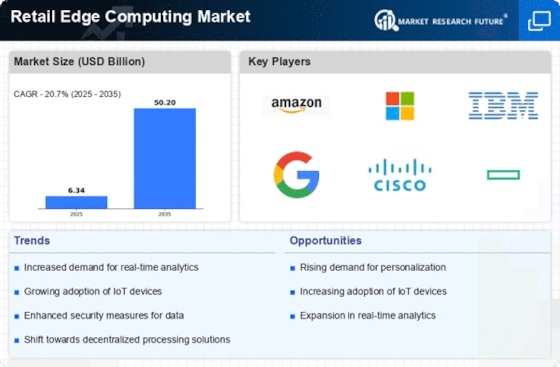Market Trends
Key Emerging Trends in the Retail Edge Computing Market
In the ever-evolving landscape of the Retail Edge Computing Market, companies have put in place various strategies to create and strengthen their market shares. One approach is through technological innovation where companies develop edge computing solutions that come with advanced features and capabilities tailored for specific needs in the retail sector. It requires utilization of latest developments in edge processing, real-time analytics, and seamless connectivity among other elements needed by retailers who are looking for fast and flexible computing infrastructures. Pricing strategies are crucial for determining a company’s position regarding its market share within the Retail Edge Computing Market. Some organizations adopt a competitive-cost strategy in order to provide such products at lower prices than those used by other firms. Under this method, they target price-conscious consumers thereby capturing more share demand through low pricing policies. On another hand some firms position themselves as value-driven providers emphasizing reliability, scalability and comprehensive features associated with their edge-computing solutions; these suppliers essentially target high-end customers who can pay substantial premiums for highly designed niche-edge computing products. Collaborations and strategic partnerships emerge as critical components of market share positioning in the Retail Edge Computing Market. Often times companies seek alliances with point-of-sale system providers, data analytics firms or industry-specific solution providers to improve both integration and application of their edge computing solutions within retail ecosystem. Such joint ventures can lead to an expanded service system encompassing a wider customer base as well as meet separate requirements within different sections of retailing sub sectors. Moreover, stable income stream and a stronger market presence can be obtained through partnerships with retail chains for joint projects or long-term contracts. Customer-centric strategies are paramount drivers for market share growth in the Retail Edge Computing Market. Companies that have seamless integration, user-friendly interfaces and responsive customer support as their priority points achieve high levels of customer satisfaction which enhances customer retention. This has led to loyalty among customers who also recommend on word-of-mouth basis thus promoting further expansion of the market share. Additionally, by understanding and addressing specific use cases or needs in retailing companies are able to customize their edge computing solutions to suit a particular segment thus making them remain competitive.


















Leave a Comment